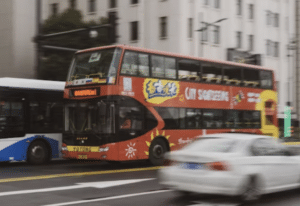Mindfulness on the Move: Small Steps for a Calmer Commute

For many of us, commuting is something we tolerate rather than enjoy. Whether you are stuck in traffic on the A38, waiting on a delayed train from Worcester, or squeezed onto a bus with barely enough room to breathe, it can feel like lost time. But what if that journey could become something more useful, even restorative?
Finding Pockets of Calm
Finding pockets of calm during a hectic routine does not require a complete lifestyle overhaul. Instead, it comes down to a few small habits. The aim is not perfection, but progress. Taking a mindful approach to commuting can help reduce stress, improve focus and set the tone for the rest of the day.
One place to start is with your phone. We all know that screen time is a hot topic, but not all use is bad. In fact, your phone can be a powerful tool for a more mindful journey. It just depends on how you use it.
Plenty of people use apps like Headspace or Calm to squeeze in a five-minute meditation on the train. Others prefer to pop in their headphones and listen to a guided breathing exercise or a podcast that helps them switch off. For some, it is simply a chance to tune out the noise and enjoy a bit of escapism.
One growing trend among commuters in the UK is finding entertainment through apps and platforms that help pass the time. Casual mobile games are a favourite, as are quizzes, puzzles, and even short streaming series.
Is Gambling the answer?
Another option that has gained popularity is having a quick flutter on online casinos not on the list of GamStop. These platforms are often favoured by those looking for something a little different from the typical UK-licensed sites. They offer a wide range of games, flexible features and a convenient way to unwind during the daily journey.
Many commuters enjoy dipping in and out of games that offer light distraction, much like fantasy football or word challenges. The appeal lies in the flexibility and variety on offer, especially during quiet moments between stops.
It is not just about digital diversions, though. Mindfulness on the move can also be as simple as paying attention to your senses. If you are on a train or bus, try noticing five things you can see, four you can hear, three you can feel, two you can smell, and one you can taste. It sounds basic, but this small exercise can stop your mind from racing and ground you in the present moment. Even if it only takes a minute, it is a useful mental reset.
For those of us who prefer driving, it might feel a little bit harder to go full-on into mindfulness. Fear not, though; it is still possible. Instead of rushing through traffic with the radio blaring, try turning down the volume and paying attention to the rhythm of your breathing or the feel of the steering wheel in your hands. Use red lights or slow-moving traffic as prompts to take a deep breath and unclench your jaw. These moments might seem small, but they most definitely add up over time and can leave you arriving a little bit more zen than when you left the house.
Another tip is to rethink the environment of your commute. Comfortable shoes, a warm drink in a proper flask, a homemade iced coffee in the Summer or even your favourite scarf can help make the experience more pleasant. Setting a calming playlist or catching up on an audiobook can help ease the edges of a long journey. You see, small comforts are not indulgent, they are practical tools for mental wellbeing.
Structure your journey
It is also worth considering the structure of your journey. Can you walk part of the way, or get off a stop earlier and stretch your legs? Physical movement, even in short bursts, helps release tension and improves your mood. Some people even find it helps them process the day ahead or unwind after work.
For some, the key to mindfulness on the move is creating a small ritual. It could be starting each journey by reading a poem, doing a quick body scan or simply sipping a favourite tea while looking out the window. Having a consistent habit like this signals to your mind that this time is yours. You do not have to fill it with tasks or noise. It is space to breathe before the day gets busy or to let go once it is done.
In a world that values speed and productivity, slowing down might seem counterintuitive. But those who take the time to find calm in the chaos often report better focus, improved mood and a bigger, more profound sense of control over their day. For many of us, the commute will never be perfect, but it can be better.
